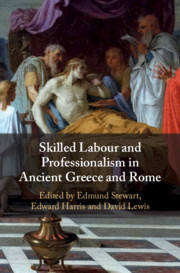Book contents
- Skilled Labour and Professionalism in Ancient Greece and Rome
- Skilled Labour and Professionalism in Ancient Greece and Rome
- Copyright page
- Contents
- Illustrations
- Contributors
- Acknowledgements
- Abbreviations
- Introduction
- Part I Professionals and Professional Identity in Greece and Rome
- Part II Specialization and the Division of Labour in the Ancient City
- Part III Case Studies of Professions 1: Sculpture
- Part IV Case Studies of Professions 2: Music and Athletics
- 9 The Profession of Mousikē in Classical Greece
- 10 Artists of Dionysus: The First Professional Associations in the Ancient Greek World
- 11 Neither Amateurs nor Professionals: The Status of Greek Athletes
- Part V Case Studies of Professions 3: A Profession of Arms?
- Index
- References
9 - The Profession of Mousikē in Classical Greece
from Part IV - Case Studies of Professions 2: Music and Athletics
Published online by Cambridge University Press: 18 September 2020
- Skilled Labour and Professionalism in Ancient Greece and Rome
- Skilled Labour and Professionalism in Ancient Greece and Rome
- Copyright page
- Contents
- Illustrations
- Contributors
- Acknowledgements
- Abbreviations
- Introduction
- Part I Professionals and Professional Identity in Greece and Rome
- Part II Specialization and the Division of Labour in the Ancient City
- Part III Case Studies of Professions 1: Sculpture
- Part IV Case Studies of Professions 2: Music and Athletics
- 9 The Profession of Mousikē in Classical Greece
- 10 Artists of Dionysus: The First Professional Associations in the Ancient Greek World
- 11 Neither Amateurs nor Professionals: The Status of Greek Athletes
- Part V Case Studies of Professions 3: A Profession of Arms?
- Index
- References
Summary
This paper explores the impact of acknowledged skill in mousikē (the ancient term which refers to the whole art of poetry, music and drama) on the income, identity and social status of poets, actors and musicians in the classical period. It is argued that the social status of these professionals depended on public recognition of the usefulness of their individual skills and the personal reputations of performers, rather than their economic class or legal order.
- Type
- Chapter
- Information
- Skilled Labour and Professionalism in Ancient Greece and Rome , pp. 269 - 292Publisher: Cambridge University PressPrint publication year: 2020

